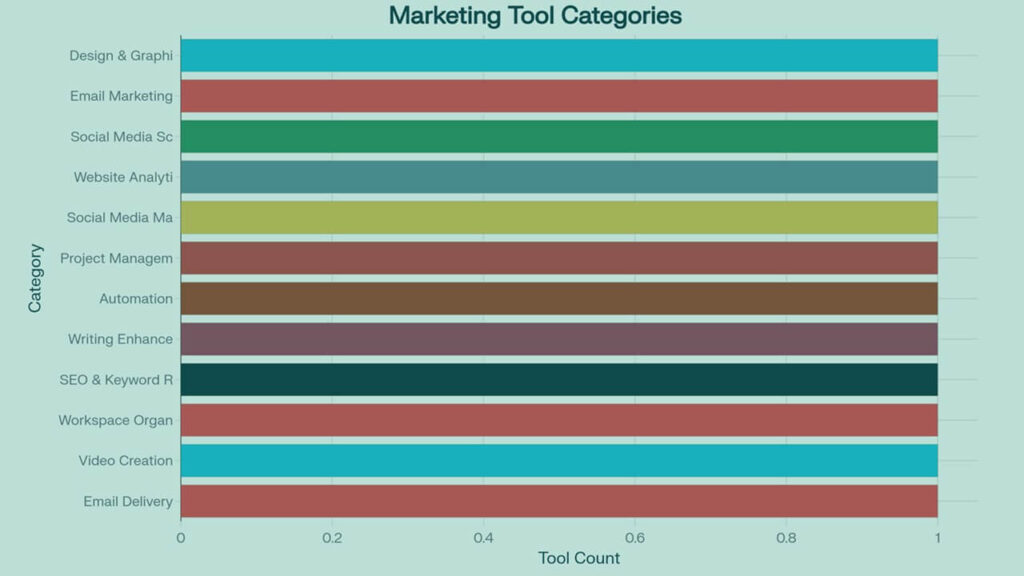Starting your entrepreneurial journey can feel overwhelming, especially when you’re bombarded with countless marketing tools and platforms promising to transform your business overnight. As a new online entrepreneur, side hustler, or small business owner, you don’t need complex enterprise solutions—you need simple marketing tools for beginners that deliver results without requiring a computer science degree to operate.
This comprehensive guide cuts through the marketing tech noise to present the most effective, beginner-friendly tools that will help you launch and grow your digital business in 2025. Every tool featured here offers robust free plans or trial periods, ensuring you can start marketing professionally without breaking the bank.

Distribution of Marketing Tools by Category – Essential tools for beginners across different marketing functions
Why Simple Marketing Tools for Beginners Matter

The marketing technology landscape has exploded in recent years, with over 11,000 different martech solutions available. This abundance creates what experts call “choice paralysis”—when too many options prevent decision-making altogether. For beginners, this means precious time spent researching tools instead of building their business.
Simple marketing tools serve as the perfect antidote to this complexity. These platforms prioritize ease of use, clear interfaces, and essential features over bells and whistles that overwhelm newcomers. Research shows that businesses using beginner-friendly tools are 34% more likely to see positive ROI within their first six months of implementation.
The key benefits of starting with simple tools include:
- Faster implementation: Most can be set up and operational within hours
- Lower learning curve: Focus on marketing strategy, not technical complexity
- Cost-effective scaling: Start free, upgrade as you grow
- Better adoption rates: You’ll actually use tools that don’t frustrate you
Essential Website & SEO Tools

Your website serves as your digital headquarters, making analytics and search engine optimization crucial for sustainable growth. These tools help you understand your audience and improve your search visibility without requiring technical expertise.
Google Analytics: Your Free Website Intelligence Hub
Google Analytics remains the gold standard for website analytics, offering comprehensive insights that would cost thousands of dollars elsewhere. The platform tracks over 200 different metrics, from basic page views to complex user journey mapping.
Key Features for Beginners:
- Real-time visitor tracking and behavior analysis
- Traffic source identification (social media, search, direct visits)
- Goal setting and conversion tracking
- Mobile vs. desktop usage patterns
- Geographic audience insights
Getting Started: Setting up Google Analytics takes just 15 minutes. Create your account, add the tracking code to your website, and within 24 hours you’ll have actionable data about your visitors. The platform’s Intelligence feature even highlights unusual activity automatically.
Pro Tip: Start with the “Audience Overview” and “Acquisition Overview” reports—these provide the most immediately actionable insights for beginners.
Google Search Console: Free SEO Health Monitoring
While Google Analytics shows what happens on your site, Search Console reveals how your site appears in Google search results. This free tool is essential for understanding your SEO performance and identifying optimization opportunities.
Essential Features:
- Search query performance tracking
- Index coverage reports (which pages Google can find)
- Core Web Vitals monitoring for page speed
- Mobile usability diagnostics
- Security issue alerts
Beginner Focus: Use the “Performance” report to see which keywords bring visitors to your site, then create more content around high-performing topics.
Ubersuggest: Beginner-Friendly Keyword Research
Neil Patel’s Ubersuggest has evolved into a comprehensive SEO toolkit while maintaining its user-friendly approach. The free plan provides three searches daily, often sufficient for small business keyword research.
Standout Features:
- Keyword difficulty scoring for realistic targeting
- Competitor analysis showing their top-performing content
- Content ideas based on trending topics
- Site audit capabilities for technical SEO issues
- Chrome extension for on-the-go research
Best Practice: Focus on long-tail keywords (3-4 words) with lower competition scores, as these provide better ranking opportunities for new websites.
Content Creation & Design Tools

Creating professional-looking marketing materials no longer requires expensive software or design expertise. These tools democratize design, enabling anyone to produce compelling visual content.
Canva: The Design Tool That Changed Everything
With over 190 million monthly active users, Canva has revolutionized graphic design for non-designers. The platform offers over 250,000 free templates, making professional design accessible to everyone.
Core Capabilities:
- Drag-and-drop design interface requiring zero technical skills
- Templates for every marketing need: social posts, presentations, flyers, logos
- Extensive library of free photos, illustrations, and icons
- Brand kit functionality for consistent visual identity
- Real-time collaboration features for team projects
2025 Updates: Canva’s AI-powered Magic Design feature now generates custom layouts based on your content. Simply input your text, and the AI creates multiple design options tailored to your brand.
Getting Started: Begin with social media post templates, as these provide the quickest wins. The platform’s tutorial videos walk you through basic design principles, transforming beginners into confident creators.
Hemingway Editor: Crystal Clear Writing
Named after Ernest Hemingway’s famously clear writing style, this tool helps marketers create more readable, engaging content. The free web version provides unlimited editing capabilities.
Key Features:
- Readability scoring (aim for grade 9 or lower for broader appeal)
- Highlights complex sentences requiring simplification
- Identifies passive voice and adverb overuse
- Suggests stronger word alternatives
- Character and word count tracking
AI Enhancement: The premium version now includes AI-powered sentence rewriting, making content optimization even faster.
Marketing Application: Use Hemingway to refine email subject lines, social media captions, and website copy. Clear, concise writing significantly improves engagement rates.
Lumen5: Transform Text into Engaging Videos
Video content generates 1200% more social shares than text and images combined, making video creation essential for modern marketing. Lumen5 simplifies this process by converting blog posts and scripts into professional videos.
Platform Strengths:
- AI-powered scene creation from written content
- Extensive stock footage and music library
- Customizable templates matching your brand
- Automated subtitle generation
- Multiple aspect ratios for different platforms
Ideal Use Cases: Convert blog posts into social media videos, create product demonstrations, or develop educational content for your audience. The free plan includes unlimited video creation with Lumen5 branding.
Social Media Management Tools

Consistent social media presence drives brand awareness and customer engagement. These tools streamline content scheduling and performance tracking across multiple platforms.
Buffer: Simplicity Meets Effectiveness
Buffer’s clean interface and straightforward approach have made it a favorite among marketing beginners. The platform manages over 100,000 business accounts, publishing nearly 8 million posts monthly.
Core Features:
- Post scheduling across 11 major platforms
- Visual content calendar for planning
- Basic analytics and performance insights
- Team collaboration tools
- Content idea storage and organization
Free Plan Benefits: Connect up to 3 social accounts with 10 scheduled posts per channel, providing 30 total monthly posts—sufficient for most small businesses starting out.
Beginner Advantage: Buffer’s queue system automatically spaces posts throughout the day based on optimal posting times, removing the guesswork from social media scheduling.
Hootsuite: Advanced Social Media Command Center
While Hootsuite no longer offers a free plan, its 30-day trial provides access to professional-grade social media management capabilities. The platform serves over 18 million users worldwide.
Professional Features:
- Unified dashboard managing multiple social accounts
- Advanced scheduling with bulk upload capabilities
- Social listening and brand monitoring
- Team workflow management and approval processes
- Comprehensive analytics and reporting
Investment Consideration: At $99 monthly for the Professional plan, Hootsuite represents a significant investment for beginners. However, businesses managing 5+ social accounts often find the efficiency gains justify the cost.
Email Marketing Platforms

Email marketing delivers an average ROI of $42 for every dollar spent, making it the most effective digital marketing channel. These platforms help you build and nurture subscriber relationships professionally.
Mailchimp: The Email Marketing Pioneer
As one of the original email marketing platforms, Mailchimp has refined its offering over two decades. The platform now serves millions of businesses worldwide, from solopreneurs to Fortune 500 companies.
Standout Features:
- Intuitive drag-and-drop email builder
- Advanced segmentation and automation capabilities
- A/B testing for subject lines and content
- Integration with 300+ business apps
- Comprehensive analytics and reporting
Free Plan Generosity: Support for 500 contacts and 1,000 monthly emails provides substantial runway for growing businesses. The free plan includes basic automation, making it possible to create welcome series and abandoned cart recovery emails.
Scaling Path: Paid plans start at $13 monthly, adding advanced features like send-time optimization, multivariate testing, and enhanced customer support.
SendGrid: Developer-Friendly Email Delivery
While primarily known for transactional emails, SendGrid’s Marketing Campaigns feature provides robust newsletter capabilities. The platform delivers over 100 billion emails monthly, ensuring exceptional deliverability rates.
Key Strengths:
- Industry-leading delivery rates (over 99% inbox placement)
- Powerful API for custom integrations
- Advanced analytics and engagement tracking
- Dedicated IP options for enhanced reputation
- 24/7 technical support
Free Tier: 100 daily emails with up to 2,000 contacts provides excellent value for transactional email needs. The platform excels at order confirmations, password resets, and other automated communications.
Organization & Collaboration Tools

Staying organized becomes increasingly important as your marketing efforts expand. These tools help manage projects, store ideas, and coordinate team activities.
Trello: Visual Project Management Made Simple
Trello’s kanban-style boards provide intuitive project visualization, making it perfect for marketing campaign management. Over 50 million users rely on Trello’s simple yet powerful approach.
Core Functionality:
- Visual boards representing projects or campaigns
- Cards for individual tasks with detailed descriptions
- Lists showing workflow stages (To Do, In Progress, Complete)
- Team collaboration with comments and attachments
- Due dates and checklist management
Marketing Applications: Create boards for content calendars, product launches, or client projects. The visual nature makes it easy to see project status at a glance.
Free Plan: Unlimited personal boards with up to 10 team members provide substantial value for small businesses. Premium features like calendar view and advanced integrations cost just $5 per user monthly.
Notion: Your Digital Workspace Hub
Notion combines notes, databases, wikis, and project management into one flexible platform. This versatility makes it ideal for entrepreneurs juggling multiple business functions.
Platform Capabilities:
- Rich text editing with multimedia support
- Powerful database functionality for contact management
- Template gallery for common business needs
- Real-time collaboration with unlimited guests
- API integrations for workflow automation
Learning Curve: While more complex than other tools, Notion’s flexibility rewards the investment in learning. The platform offers comprehensive tutorials and templates to accelerate adoption.
Free Individual Plan: Unlimited blocks and pages for personal use make Notion accessible to solo entrepreneurs. Team features start at $10 monthly per user.
Automation & Integration Tools

As your tool stack grows, automation becomes essential for maintaining efficiency. These platforms connect your various tools and automate repetitive tasks.
Zapier: The Integration Automation Leader
Zapier connects over 7,000 different apps, enabling powerful workflow automation without coding knowledge. The platform processes over 1 billion automated tasks monthly.
Automation Capabilities:
- Trigger-based workflows connecting multiple apps
- Multi-step sequences for complex processes
- AI-powered workflow suggestions and optimization
- Custom filters and conditional logic
- Error handling and notification systems
Beginner-Friendly Examples:
- Automatically add new email subscribers to your CRM
- Create Trello cards from new form submissions
- Send Slack notifications for important email opens
- Update spreadsheets from social media mentions
Free Plan: 100 monthly tasks with 5 active workflows provide excellent value for testing automation concepts. Most small businesses can operate within these limits initially.
Growth Path: Paid plans start at $20 monthly, unlocking unlimited automations and premium app integrations essential for scaling businesses.
Choosing the Right Tools for Your Business

With dozens of excellent options available, selecting the right tools requires strategic thinking about your specific needs and constraints.
Start with Your Core Marketing Needs
Before exploring tools, identify your primary marketing objectives:
- Content Marketing: Prioritize Canva for design and Hemingway for writing
- Email Focus: Begin with Mailchimp for newsletters and automation
- Social Media Heavy: Choose Buffer for scheduling and Hootsuite for management
- SEO Priority: Start with Google Search Console and Ubersuggest
- Organization Needs: Select Trello for visual project management
The Essential Starter Stack
For most beginners, this combination provides comprehensive marketing capabilities:
- Canva for all visual content creation
- Mailchimp for email marketing and automation
- Buffer for social media scheduling
- Google Analytics for website insights
- Trello for project organization
This stack covers the fundamental marketing functions while remaining free or extremely affordable. Each tool integrates well with others, creating a cohesive marketing system.
Integration Strategy
Modern marketing success depends on tools working together seamlessly. Consider these integration priorities:
- Design to Social: Connect Canva designs directly to Buffer for streamlined posting
- Email to Analytics: Use UTM parameters to track email campaign performance
- Automation Glue: Employ Zapier to connect tools lacking native integrations
- Centralized Data: Ensure all tools feed data into Google Analytics for unified reporting
Common Mistakes to Avoid

Learning from others’ mistakes accelerates your marketing tool mastery. These pitfalls consistently trap beginners:
Tool Overload Syndrome
The biggest mistake beginners make is adopting too many tools simultaneously. Research shows that marketers using 6-10 tools report higher satisfaction than those using 15+ tools. Start with 3-5 essential tools and master them before expanding.
Choosing Based on Popularity Alone
Popular doesn’t always mean suitable for your specific needs. A Fortune 500 company’s tool recommendation might overwhelm a solopreneur. Evaluate tools based on your actual requirements, budget, and technical comfort level.
Ignoring Training Resources
Every tool offers tutorials, webinars, and help documentation. Successful users invest time in learning proper usage rather than stumbling through features. Most platforms provide certification programs that enhance your marketing skills while teaching tool mastery.
Focusing on Features Over Results
Advanced features mean nothing if they don’t improve your marketing outcomes. Choose tools that help achieve specific business goals rather than impressive feature lists that remain unused.
Tips for Tool Success

Maximize your marketing tool investment with these proven strategies:
Start Small, Scale Smart
Begin with free plans to test tool fit before committing financially. Use upgrade decisions as business growth milestones—when you outgrow free limitations, you’re ready for paid features.
Prioritize Integration Capabilities
Tools that work well together multiply effectiveness. Check integration options before committing to new platforms. Native integrations typically work better than third-party connections.
Track Tool ROI
Monitor which tools actually contribute to business growth. Tools that save significant time or generate measurable results justify their cost. Others may be candidates for replacement.
Build Templates and Workflows
Create repeatable processes within each tool. Design templates, automation sequences, and standard operating procedures that maintain consistency while saving time.
Getting Started: Your Action Plan

Transform this knowledge into action with a systematic approach:
Marketing Tools Quickstart Checklist
Week 1: Foundation Setup
- Choose 3-5 tools from the essential stack
- Create accounts using consistent business information
- Complete basic setup tutorials for each platform
- Connect tools where native integrations exist
Week 2: Content Creation
- Design your first social media posts in Canva
- Write and send a test email campaign in Mailchimp
- Schedule one week of social content in Buffer
- Set up basic Google Analytics goals
Week 3: Optimization
- Review analytics from your initial campaigns
- Identify which tools feel intuitive vs. confusing
- Make adjustments to workflows and processes
- Consider additional integrations through Zapier
Month 2: Expansion
- Evaluate upgrade needs based on usage patterns
- Add one new tool if gaps remain in your workflow
- Begin more advanced features like automation
- Develop consistent processes and templates
Looking Forward: Your Marketing Tool Evolution
Your tool needs will evolve as your business grows. Plan for this progression:
Startup Phase (0-6 months): Focus on free tools with generous limits. Priority: learning fundamentals and establishing processes.
Growth Phase (6-18 months): Selectively upgrade tools showing clear ROI. Add specialized tools for specific needs like advanced analytics or automation.
Scale Phase (18+ months): Consider enterprise solutions offering advanced features, dedicated support, and enhanced integration capabilities.
Remember that tool mastery trumps tool quantity. A expert using 5 simple tools will outperform a beginner juggling 20 advanced platforms.
Conclusion
The marketing technology landscape can seem overwhelming, but success comes from starting simple and building systematically. The simple marketing tools featured in this guide provide everything needed to launch and grow a successful digital business without complexity or excessive cost.
Your marketing success depends more on consistent execution than perfect tool selection. Choose tools that match your current skill level and business needs, then focus on creating valuable content and building meaningful relationships with your audience.
The tools are just the beginning—your creativity, persistence, and commitment to serving your customers will ultimately determine your marketing success. Start with one or two tools today, and begin building the marketing system that will fuel your entrepreneurial dreams.
Ready to get started? Pick two tools from this guide, set up your accounts, and launch your first marketing campaign this week. The journey of a thousand miles begins with a single step—and your marketing transformation starts now.
Sources: This guide draws from extensive research across marketing technology platforms, user reviews, and industry best practices from 2025 marketing data.
This article is part of our “Tools & Resources for New Online Entrepreneurs” content cluster, providing actionable insights to help you build and scale your digital business with confidence.
